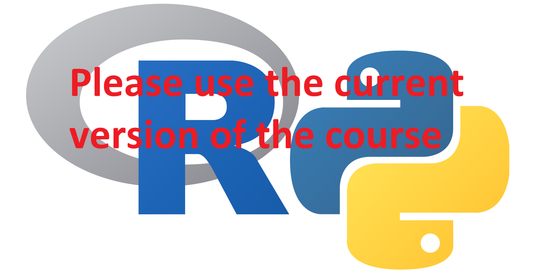
Basic concepts of programming in R and Python for Digital Health
This is a past course: please register in the current course version.
Idioma: English
Beginner, Digital Health, Programming
Información del curso
This is a past course: please register in the current course version.
Course topics include data structures, program control statements (conditional execution, loops, etc.), data input/output, analysis and visualization for R (9 weeks, 2023-10-16 to 2023-12-18) and Python (6 weeks, 2024-01-08 to 2024-02-12).
The course is set up to technically require no previous programming skills. However, if you have little coding experience, you'll have to spend more time on this course than expected by the credit points. The weekly time requirement is projected to be between 2 and 9 hours.
The lectures are presented in short online videos accompanied by interactive programming exercises through CodeOcean. They can be watched / solved at your own time and pace.
The tutorial sessions take place in person on Mondays (13:30-15:00) in G2.U.10 (Campus III, Digital Health Center, basement floor). The tuesday time slot in the schedule is for your own time allocation, there is no central meeting planned.
The tutorials are designed to:
- answer your questions and those posed by others
- look at your code for things that may be optimizable or even bad habits
Grading is based 50/50 on separate R (December) and Python (February) exams.
Contenido del curso
R1: intro:
welcome, showcase, configuration (R & Rstudio), interactive exercises, syntax, help, vectorsR2: basics:
statistics, functions, conditions, packagesR3: data types:
logicals, charstrings, categories, overviewR4: objects:
data.frame, matrix, list, arrayR5: real data:
read, merge, missing values, sourcesR6: plots:
scatterplots, line plots, barplots, low level commandsR7: figures:
composition, histograms, boxplots, exporting, outlookR8: flow control:
debugging functions, loopsR exam:
Mo Dec 18, in the tutorial time slot 13:30 - 15:00 (CET)P1: intro & functions:
Python intro, syntax, data types, character strings, writing functionsP2: collections & conditions:
Collections (overview), lists, sets, tuples, dictionaries, conditional code executionP3: loops:
loops, list comprehensionP4: errors & classes:
managing errors, writing classesP5: numpy & pandas:
numpy, pandas, missing values, applicationsPython exam:
Mo Feb 12
Matricularme en este curso
Learners
Curso impartido por

Berry Boessenkool has been teaching R courses in various formats since 2012. He is a freelance R trainer and consultant and works part-time as a lecturer at HPI. His passion for programming was sparked in his studies of geoecology and the analysis of environmental data is still close to his heart.

Prof. Dr.-Ing. Bert Arnrich is Professor for Digital Health – Connected Healthcare at the Digital Health Center of the Hasso Plattner Institute. His research on ubiquitous sensing and computing technologies is directed towards paving the way for transforming healthcare systems from purely managing illness to maintaining wellness everywhere, anytime and for anyone. He has been a PI in several European and national projects. He has co-authored over 120 refereed research publications. He studied "Informatics in the Natural Sciences" and received the PhD degree Dr.-Ing. for the thesis "Data Mart Based Research in Heart Surgery" from Bielefeld University in 2006. He established and headed the research group Pervasive Healthcare in the Wearable Computing Laboratory at ETH Zurich between 2006 and 2013. He received an EU FP7 Marie Curie Cofound Fellowship in 2013 and was appointed to tenure track professorship at the Computer Engineering Department at Bosporus University until 2017. Between 2017 and 2018 he worked as a Science Manager for Emerging Technologies at Accenture Technology Solutions.